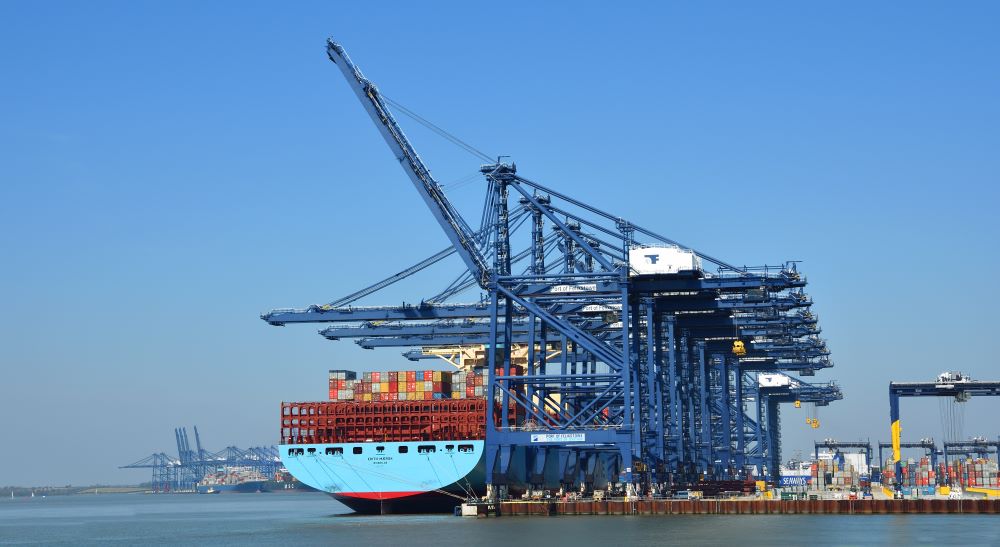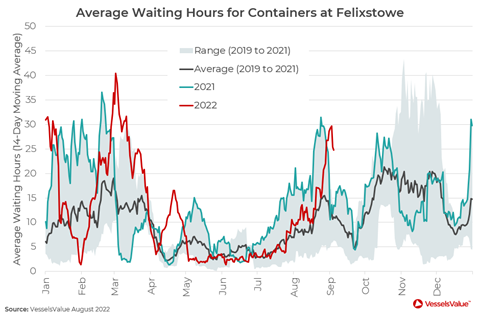
The announcement of a second strike at Port of Felixstowe, the UK’s largest container port, has caused alarm bells to ring throughout British industry.
It’s the second such strike within a month and will overlap with similar industrial action at the Port of Liverpool, magnifying the impact of any disruption.
New research, released this week by VesselsValue, shows that average waiting times for containers at Felixstowe shot up in August during the last round of industrial action, rising from about five hours earlier in the summer to a peak of 30 hours during the strike.
The impact on supply chains, particularly in a period where many retailers are preparing for the busy Christmas trading period, is bound to be significant.

An unwelcome disruption
Arshad Dadabhoy, trade and customs specialist team lead at the Institute of Export and International Trade’s Academy, says that the disruption caused by such strikes is always unwelcome.
“The interruption to supply chains causes havoc across many sectors, but is particularly acute in manufacturing and retail, where companies need to source products, parts and components from across the world,” he says. “Many have become accustomed to a well-oiled supply chain, deploying logistical and manufacturing models such as just in time and lean manufacturing.
“In lots of these systems the smallest ripple can create huge waves of problems. Closing one major port could lead to some empty shelves, project delays and production lines being forced to stop due to a lack of components. Supply chains are increasingly integrated across borders and therefore the repercussions are often felt further afield.”
Dadabhoy adds that the effect can quickly escalate globally, citing the example of the microchip shortage that resulted from the Covid-19 shutdowns and its impact on the automobile sector around the world.
Develop a plan
He suggests that businesses need to put a contingency plan in place, so they’re better prepared when unexpected situations such as strikes arise.
“Contingency planning is key to a business’s long-term success,” says Dadabhoy. "A well developed, tried and tested contingency plan measures the impact on a business in event of disruption.”
It begins, he says, by forming a team that includes representatives from all key departments within an organisation. The aim of the team is to identify all potential disruptions, from IT failures and strikes, to fires, machinery breakdowns and any other potential areas of disruption. Only once these have been identified can you begin to mitigate each of these risks by forming a recovery plan for each scenario.
“It is essential these plans are prepared ahead and reviewed periodically to ensure they remain fit for purpose,” says Dadabhoy. “Business requirements, approvals, certifications, systems and technologies change, so your contingency plan must be updated to reflect these changes.”
In the case of supply chains, the team needs to create a bank of potential alternative suppliers who have been pre-vetted and approved. This will take time but investing this time upfront can save a business in case of a major disruption.
“In the current scenario of port strikes, conversations should revolve around alternative methods of importing or exporting. Your contingency plans need to involve air freight, rail, alternative ports or road freight options,” says Dadabhoy.
Review contracts
Many supply and purchase agreements include penalty clauses, which require the buyer or seller to compensate for losses resulting from non-delivery. These can be actual losses or penalties for non-conformance.
“It is imperative for you to review any existing agreements you have in place and seek legal advice on any new agreements the business is entering into, to ensure any penalty or compensation clauses are either mitigated or minimised sufficiently to cover instances such as next week’s strikes, which are outside of your company’s control,” says Dadabhoy.
Consider insurance
Companies should think seriously about taking out business interruption insurance to cover losses, lost profits, damages, penalties and other unexpected costs that result from business disruption.
As Dadabhoy explains, “Insurance companies offer a variety of policies that provide different levels of cover for differing eventualities. Companies need to consider the level and type of cover needed, but again this can only be done once a detailed review of the risks and weaknesses of the business have been identified and built into your contingency plan.”
Unexpected business disruption impacts customers and suppliers alike, and your business’ survival may depend on the strength of your relationship with key stakeholders, and how well you manage and respond to any unexpected situation that arises.
“Any company needs to show resilience in the face of adversity. Ultimately it will be your ability to recover and the speed with which you can get back on a normal footing after such an interruption that will inspire confidence in stakeholders to continue doing business with you.”
IOE&IT business members can use the IOE&IT's International Trade Technical Helpline to get expert advice on demand in case of supply chain disruption or goods being held up at ports in the UK or abroad.
Sign up today for access to a unique range of benefits and services for competitive advantage in international markets.



